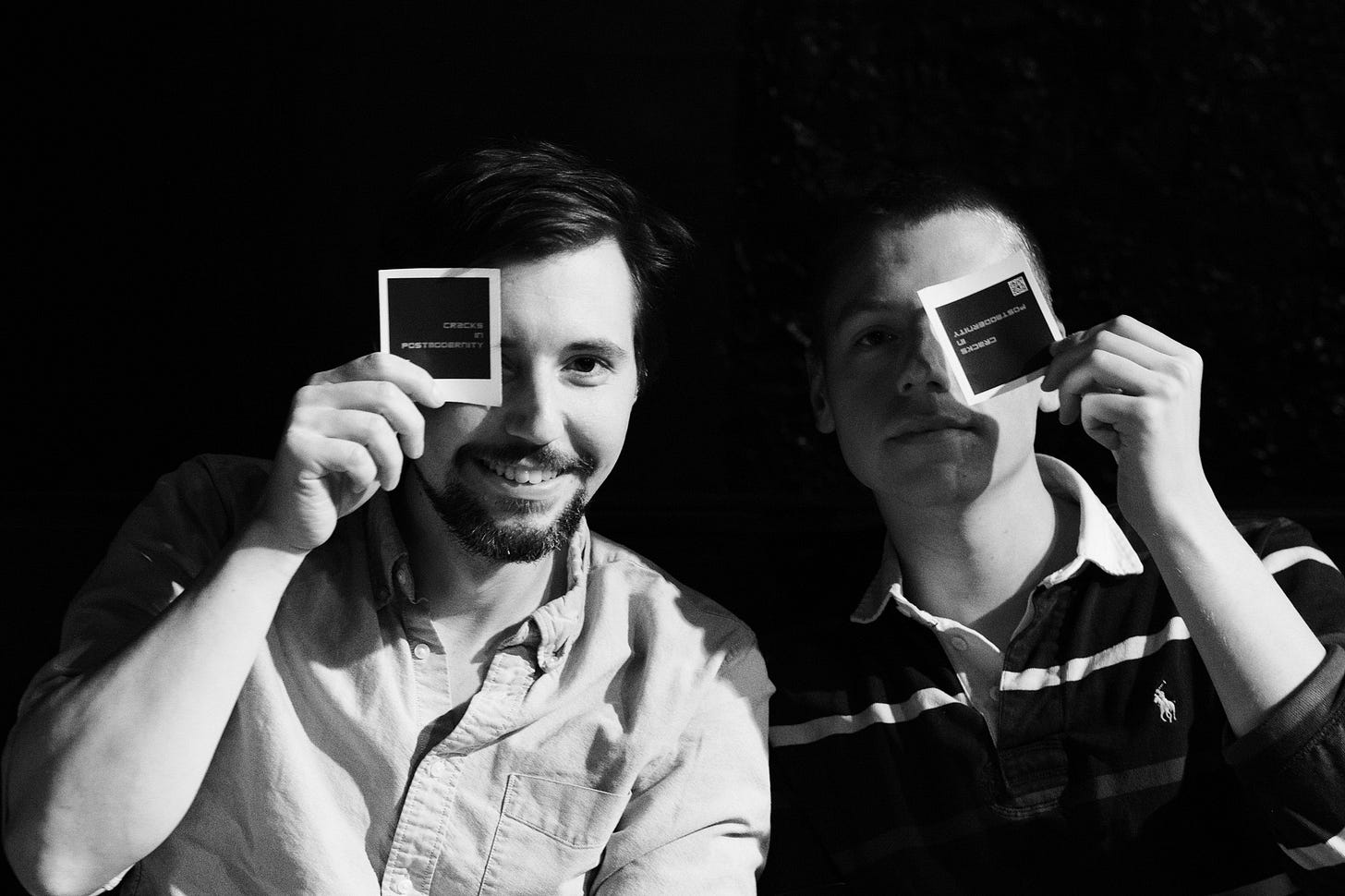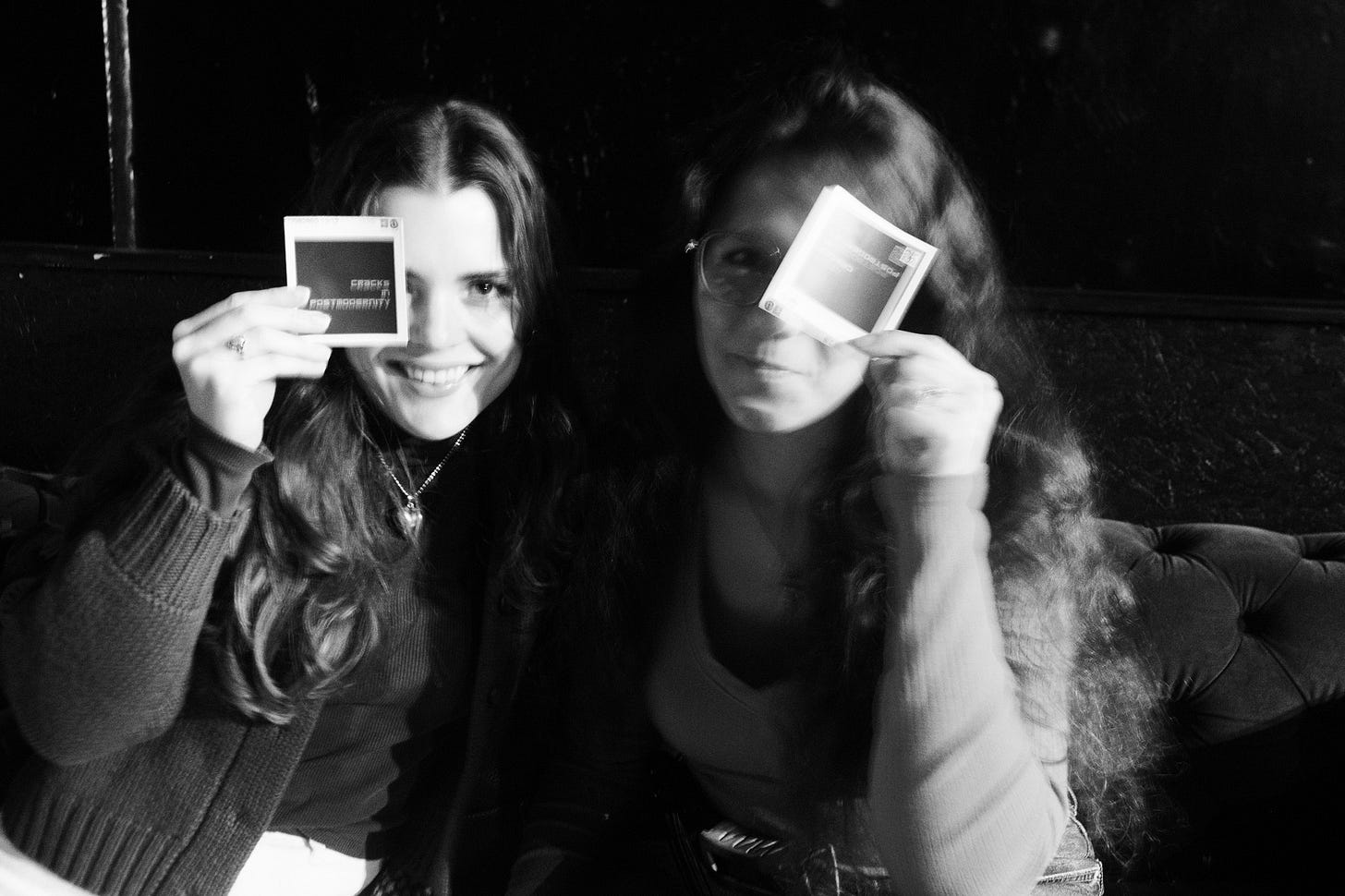Thanks for helping us hit 3k subscribers. In honor of the occasion, we’re going to:
drop an updated version of our manifesto (check out the original here).
offer a 50% off flash sale for our free subscribers who wanna upgrade to paid
ask you to consider upgrading to be a Founding Member (we need the money frfr…and you’ll get a free copy of the next zine and you’ll get invited to our exclusive Group Chat as well as to exclusive meet ups!)
ask you to refer your friends—so we can work our way up to 4k…and so you can get a reward!
Manifesto 2.0
Our Agenda
Too much of public discourse today is centered on politics and [moralistic] ethics. It is our contention that (a) public discourse should aim toward some semblance of objectivity, and should respect the consciences of viewers/readers to come up with their own moral/political conclusions and that (b) we cannot come to moral or political conclusions without first considering matters of metaphysics/ontology and aesthetics/culture. This is why we focus on “metadiscursive” matters—religion/philosophy and culture—and only touch on moral/political issues in as much as they intersect with spiritual/cultural ones (cultural politics, political philosophy, political discourse).
This is also why we aim to draw in people with vastly different beliefs. We try to speak to that which is most essential, most human, and thus most capable of resonating with all kinds of people—respecting their freedom to come to their own conclusions when it comes to morals and politics.
We fear that what Olufemi Taiwo calls “elite capture” has sown confusion and division. We bicker over our alleged “liberal” and “conservative” positions—which ultimately are hollow “simulations” of organic positions, which mainly lack any referent in reality. Our espousal of these positions amount to the regurgitation of scripts that’ve been fed to us from “on high.” The tribalism that follows leads to social division, which weakens our agency and renders us more vulnerable to manipulation by those who set the terms of the discourse.
Thus, it is our aim—following the cues of Peter Maurin and Dorothy Day—(a) to offer clarification of thought, to sift through the discourse and parse out the arguments being made, distinguishing the substantial from the trivial, the real from the manufactured and (b) by doing so, to make it easier to establish some kind of common sensical consensus…and even if we don’t end up agreeing completely, to at least be united in our attempt to understand each other.
Our mission is to engage with postmodern thought and culture, which despite being “problematic” and faulty in many regards, are often quite fascinating. Thus, we are determined to risk seeking the shards of truth cracking through postmodernism. We are not naive about how risky this endeavor is, and we are not afraid to call out errors when we see them. But we also refuse to completely swear something off just because it is erroneous—especially if it is fascinating. Of course, we must give priority to that which is coherent, while experimenting with the more interesting stuff (with adequate guardrails).
And the sad fact is that most people who are interesting today are wrong about a lot of things, whereas most people who are right about a lot of things are really boring sticks-in-the-mud. In a certain regard, people who are wrong yet interesting are more “alive,” are more “true” than correct-but-lifeless people; by virtue of their passion, their being more fully “alive,” they communicate the truth better than the others do [“the glory of God is man fully alive”].
We also aim to function as a sort of court jester, attempting to bring some levity into a very self-serious culture, reminding us that life is a gift that is worth enjoying, and that we are broken, foolish sinners. We are not God—and thus we need to laugh at ourselves sometimes (lest we get confused and think we are actually gods unto ourselves). We aim to be playful provocateurs, contrarians—both for the sake of humor and entertainment, but also to offer something new, outside-the-box, and innovative in a very dry, serious cultural landscape, where we regurgitate the tired platitudes without really knowing what we believe or what matters to us.
We are both pro-sin “as sin” and anti-normalizing it. We recognize that (a) we are broken creatures in need of redemption and (b) that if we forget this fact, we risk normalizing evil (which is dangerous, requiring us to play God and redefine reality in an Orwellian sense) or demonizing sinners, thus nullifying the potential of their wayward desires/behavior to witness to the need for God’s mercy and to be integrated in creative ways for the sake of the common good. No one will stop sinning for good. But if we accept sin as normal, we create a lot of dangerous situations. Sin must be (a) sublimated into “supernatural spaces” (b) “released” periodically into spaces of anti-structure or (c) relegated to the realm of the “underground.” Thus, we believe in a polyvalent/multilayered cultural model.
Past posts that further flesh out our agenda
Dorothy Day, the Catholic Worker, and Cracks in PoMo (presentation at Maryhouse)
The Right’s Co-Opting of Post-liberalism (interview with John Milbank)
Our beats
Rootedness:
Anti-suburbia/pro-urban and -rural, pro-ethnic spiciness/anti-assimilationist, anti-nuclear family/pro-multigenerational families, pro-third spaces, Globoskeptic, Technoskeptic, pro-localist, pro-subsidiarity, pro-communitarian, anti-gig economy/third party delivery apps
Decadence:
Pro-preserving the tensions between the Dionysian and Apollonian principles, pro-sin/anti-normalizing it, pro-cigarette/anti-weed, sympathetic to classical pagan, Catholic, and Islamic aesthetics, pro-queer-trad horseshoe
Metadiscursive consciousness:
Pro-ideological horseshoes, pro-reading too much into pop culture, pro-tradition/anti-traditionalism, pro-progressive+traditional paradigm/anti-liberal vs. conservative paradigm, pro-provocation/anti-polarization (solidarity), pro-maintaining tension between opposing poles (dialogue, multi-partisan coalitions, horseshoes, big tents, etc)
Our influences
Primary
Dorothy Day, Camille Paglia, Andy Warhol, Charles Taylor, Oscar Wilde, Jean Baudrillard, Peter Maurin, Pier Paolo Pasolini, Cornel West, J.K. Huysmans
Secondary
Lady Gaga, Rosalia, Federico Fellini, Lorenzo Albacete, Teresa of Avila, Quentin Crisp, Matthew B. Crawford, Chris Arnade, William T. Cavanaugh, John Milbank, DC Schindler, Federico Garcia Lorca, Adam Curtis, Simone Weil
Honorable mentions
James Franco, Slavoj Zizek, G.K. Chesterton, Michael Novak (pre-neocon), Marc-Andre Raffalovich, Christopher Beha, Byung Chul Haan, Friedrich Nietzsche, Soren Kierkegaard







